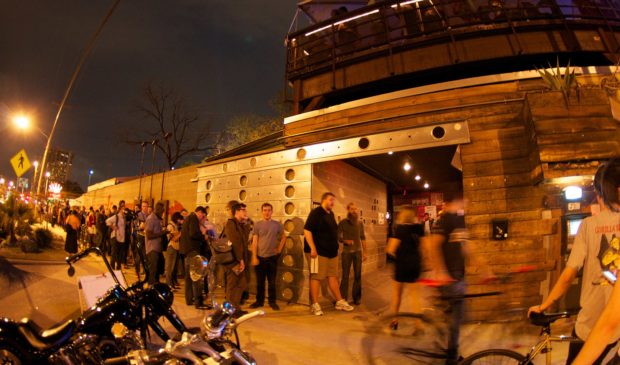Commission wants live music venues specified in CodeNEXT
Wednesday, December 6, 2017 by
Chad Swiatecki Austin city staff and live music industry stakeholders are working to add a “live music venue” use case designation to CodeNEXT, the city’s in-process building code that will determine how Austin grows over the next two-plus decades. If approved for the final draft of CodeNEXT next year, the change could make it easier to open and operate, and more precisely regulate, businesses where live music performance is the main mission.
Members of the Austin Music Commission considered a request at Monday’s meeting to vote in support of a measure to recommend that the Planning Commission and Zoning and Platting Commission make live music venues a specific land use in the document, the next version of which is expected to be released in early 2018. Commissioners opted to put the request on the agenda for the January meeting so the language outlining what qualifies as a live music venue can be reviewed by legal experts.
The issue is also being pursued by staff within the Music and Entertainment Division so that the change could possibly be added into the city’s existing code on the off chance that the CodeNEXT process stalls or is abandoned.
Music supporters argue the live music venue designation is needed because those businesses are different from traditional bars and nightclubs – currently the only use classification for all nightlife-oriented businesses – that place less of an emphasis on music performance and tend to create fewer paying opportunities for musicians or DJs to perform.
The intent of the move is to make live music venues a business use that is permitted across the board instead of requiring hearings and various levels of regulatory approval as is currently the case for all such businesses other than in the downtown entertainment districts, where bars and nightclubs are permitted without further approval.
Proponents at Monday’s meeting said that the change could make it easier for live music venues to open in neighborhoods outside the downtown core and create more chances for musicians to secure paying gigs.
“Perhaps someone could open a second Stubb’s or (another) Saxon Pub or some other local music venue in Northwest Austin and then people don’t have to traipse downtown when they want to see music,” said Dave Sullivan, a member of the CodeNEXT advisory group.
Sullivan said he’d like to see inclusion of live music venues made a preferred consideration for density bonuses offered to the development of future community gathering spaces around the city that were specified as a goal during the Imagine Austin process.
The Austin chapter of the Music Venues Alliance has taken the lead on crafting the guidelines for what qualifies as a live music venue, as opposed to a restaurant, bar or other business that includes occasional live music as a complement to its main business pursuits.
Qualifying venues would need to clearly specify how musician payouts are calculated or guaranteed, and would need to have at least five of seven business components typical of a live music venue. Those components are:
- has a defined performance stage
- has a mixing desk, sound system and lighting rig
- has backline equipment
- has at least two staff members handling some combination of sound engineering, booking, promoting, stage management and security
- charges a cover or uses a ticketing system for admission
- markets music programming through printed or digital publications
- has hours of operation that coincide with performance times
Commission members asked that a minimum number of performances per week or month be added to the matrix of factors.
Rebecca Reynolds, president of MVA Austin, said a live music venue classification would also add clarity to enforcement of noise violations that brought about a move to install an “agent of change” concept in the city code earlier this year. Such designated businesses could also possibly be considered for funds from the city’s Hotel Occupancy Tax directed toward pro-tourism efforts.
“It’s important to clean up that part of the code because sports bars, shot bars and live music venues are all treated the same, but they are not the same,” she said. “It has been hard to get the distinction right for what separates (music venues) from bars and nightclubs, but we’ve had lots of back and forth to get the essential elements without being too broad or making it too exclusive and hard for a venue to qualify.”
Photo by Nash Cook (Flickr) [CC BY-SA 2.0], via Wikimedia Commons.
The Austin Monitor’s work is made possible by donations from the community. Though our reporting covers donors from time to time, we are careful to keep business and editorial efforts separate while maintaining transparency. A complete list of donors is available here, and our code of ethics is explained here.
Curious about how we got here? Check out the Austin Monitor’s CodeNEXT Timeline.
You're a community leader
And we’re honored you look to us for serious, in-depth news. You know a strong community needs local and dedicated watchdog reporting. We’re here for you and that won’t change. Now will you take the powerful next step and support our nonprofit news organization?









